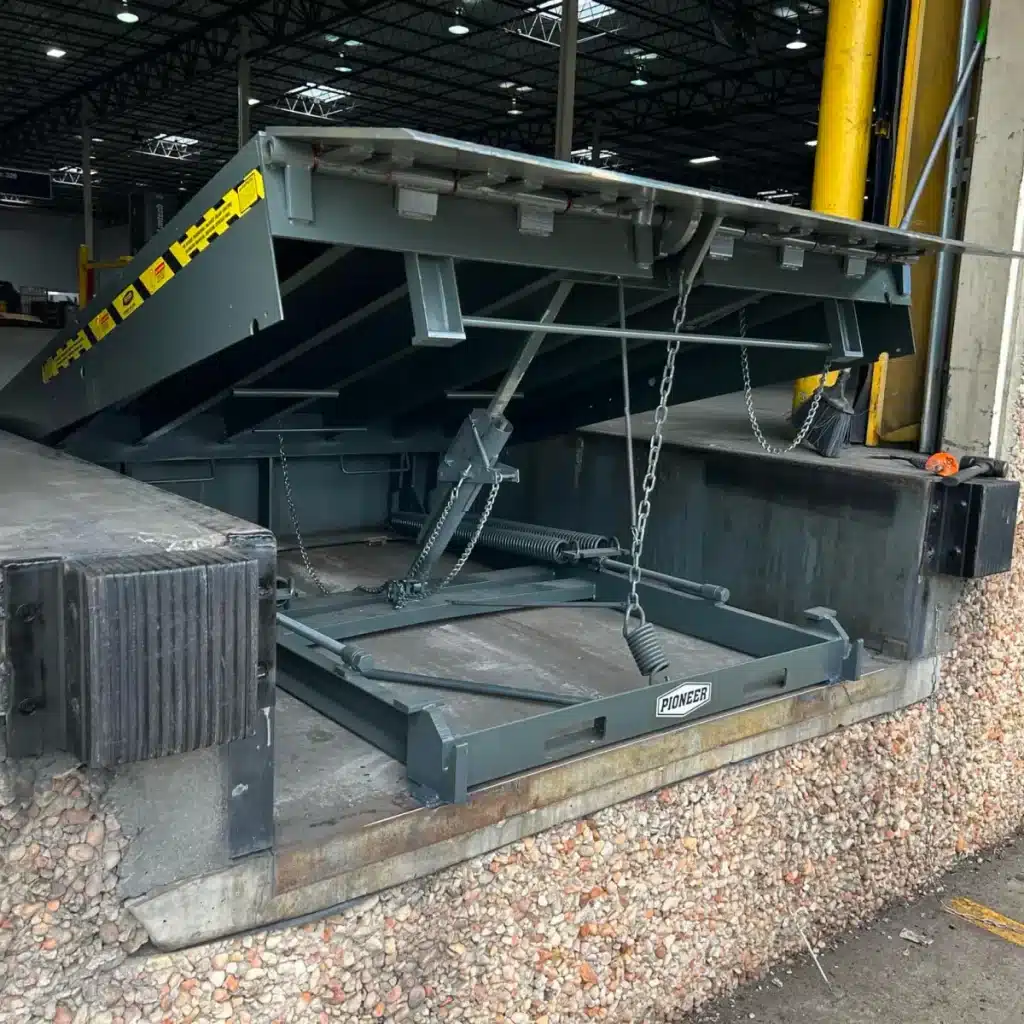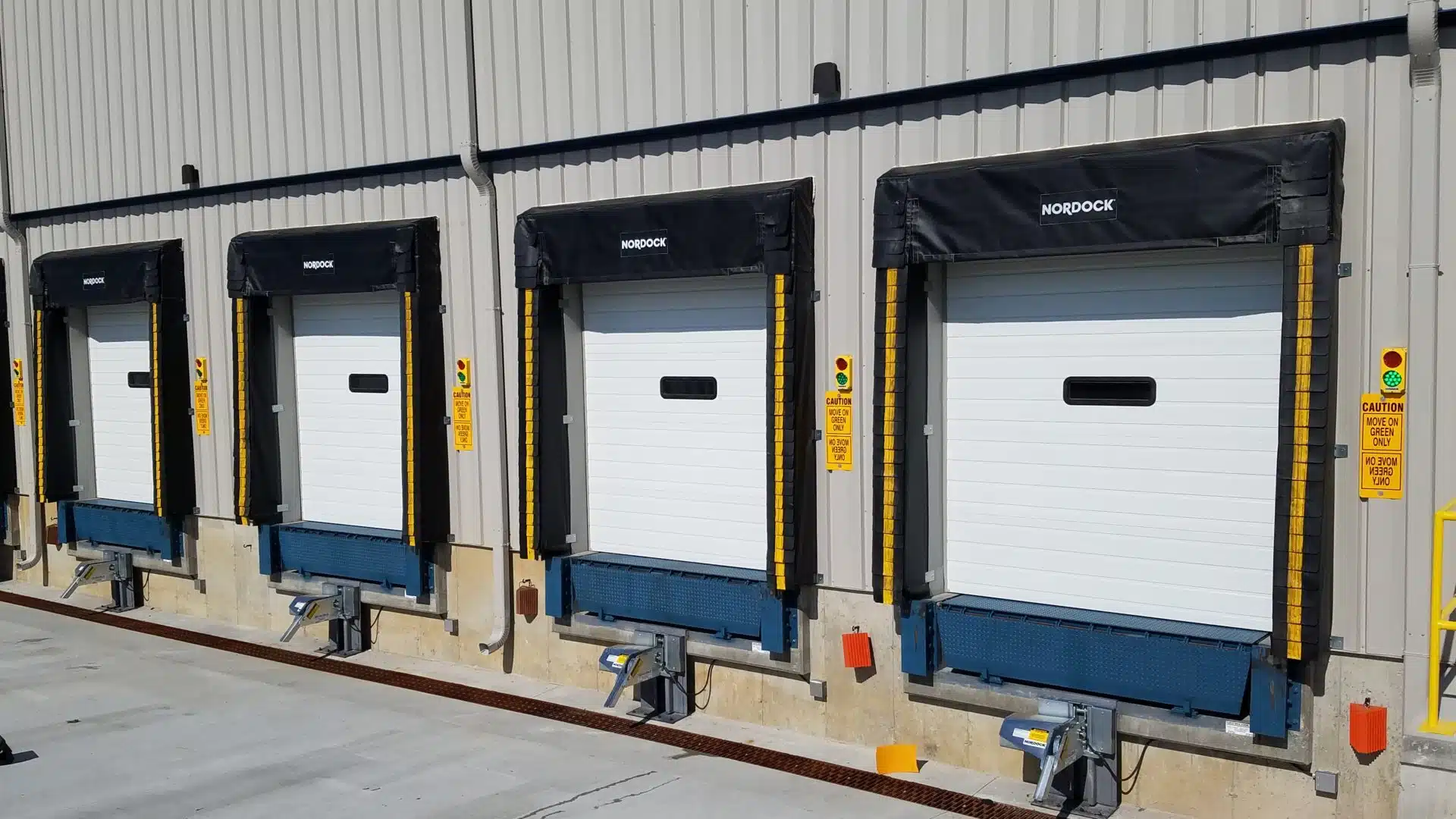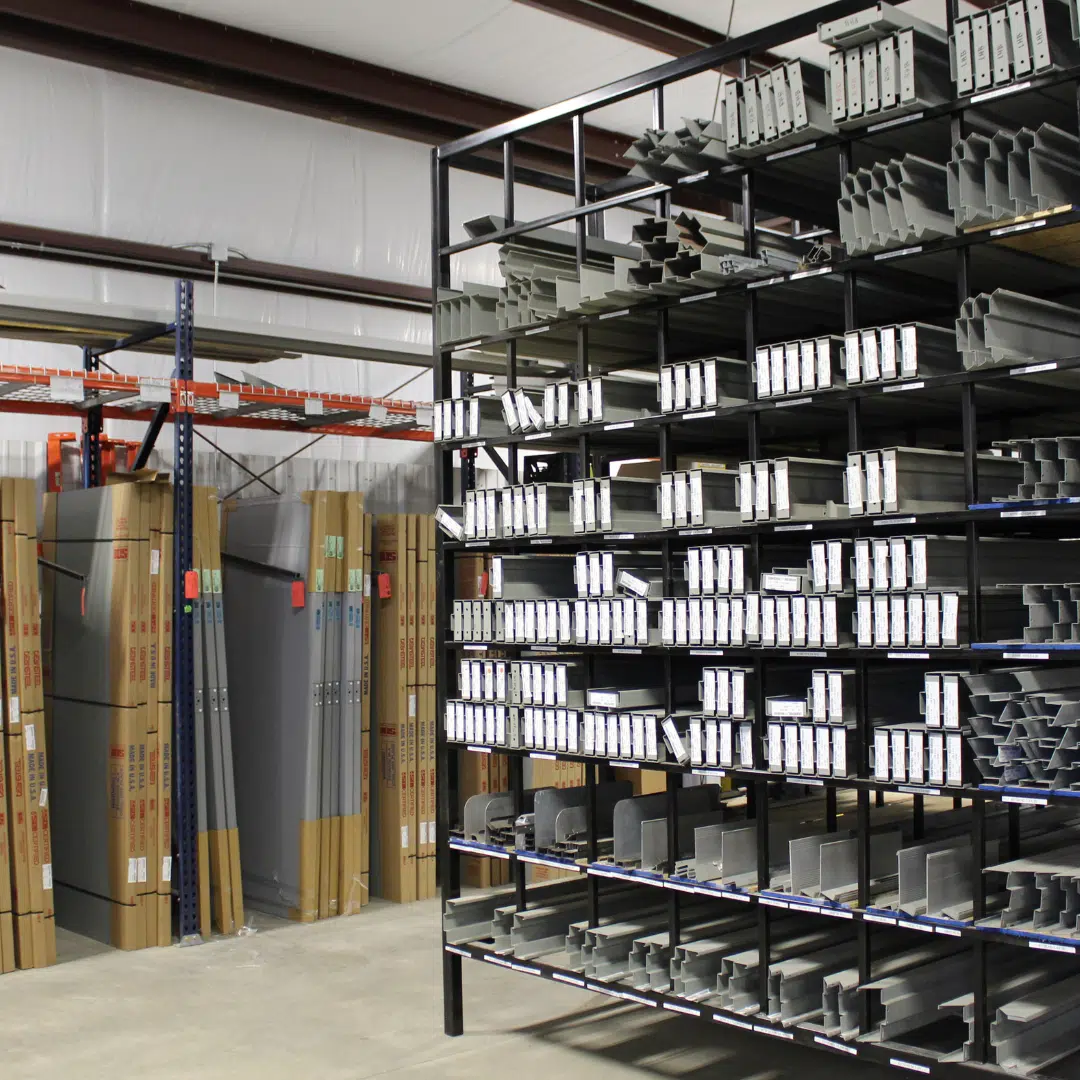Choosing the right dock leveler can make or break your warehouse operations. If your team deals with heavy traffic or tight deadlines, even small delays or safety risks can lead to major problems. That’s why it’s important to choose the right solution upfront.
Mechanical vs. Hydraulic Dock Levelers is a standard comparison, and for a good reason. These two types serve the same function but operate differently, with distinct pros and cons. From cost to ease of use, your decision depends on what matters most to your facility.
In this guide, we’ll break down both options. You’ll discover which leveler type works best for your workflow, budget, and safety standards. Read on to find the dock leveler that fits your business and supports long-term success.
What Are Dock Levelers and How Do They Work?
Dock levelers make loading and unloading much safer by filling the space between the dock and the truck. This creates a smooth path for workers and forklifts to move goods without slips, bumps, or danger.
The most common choices are mechanical and hydraulic models. They do the same job but in different ways. One uses manual effort, while the other uses power. Choosing the right one depends on how often you load, your budget, and how easy you want the system to be.
Understanding the difference between Mechanical vs. Hydraulic Dock Levelers helps you decide what fits your needs best. The right choice can save time, reduce accidents, and make daily work easier for your whole team.
How Mechanical Dock Levelers Work
Mechanical dock levelers rely on manual or spring-assisted mechanisms to raise and lower the platform.
They typically use a combination of springs, levers, and counterweights to adjust the height.
Pros of Mechanical Dock Levelers
- Lower Initial Cost: Mechanical models are generally more affordable upfront compared to hydraulic systems.
- Minimal Maintenance: With fewer moving parts and no hydraulic fluid, they require less upkeep.
- No Power Dependency: Since they operate manually, they don’t rely on electricity or hydraulics, making them reliable in power outages.
Cons of Mechanical Dock Levelers
- Physical Effort Required: Workers must manually operate the leveler, which can be strenuous over time.
- Slower Operation: Adjusting the height takes more time compared to hydraulic systems.
- Limited Weight Capacity: They may not be ideal for extremely heavy loads, as they rely on manual force.
How Hydraulic Dock Levelers Work
Hydraulic dock levelers use fluid pressure to raise and lower the platform.
A hydraulic pump powers the system, making adjustments smooth and effortless.
Pros of Hydraulic Dock Levelers
- Ease of Use: Workers can operate them with minimal effort, often via a push-button control.
- Faster Adjustments: Hydraulic systems respond quickly, improving workflow efficiency.
- Higher Weight Capacity: They handle heavier loads more effectively than mechanical models.
Cons of Hydraulic Dock Levelers
- Higher Initial Cost: The advanced technology makes them more expensive upfront.
- Maintenance Requirements: Hydraulic fluid needs periodic checks, and leaks can occur over time.
- Power Dependency: If there’s a power failure, some models may not function unless equipped with a backup system.
Mechanical vs. Hydraulic Dock Levelers: What’s the Difference?
To better understand which option suits your needs, let’s compare them across key factors:
1. Cost Comparison
Mechanical dock levelers are less expensive to purchase, making them a smart option for small businesses. Hydraulic dock levelers cost more upfront, but they give better long-term value through easier operation, less physical work, and more reliable performance for busy loading areas.
2. Durability and Maintenance Needs
Mechanical dock levelers have fewer parts, so they break less often and are easy to maintain. Hydraulic models are durable but require regular checks, like fluid levels and seal replacements, to keep them running smoothly and avoid costly problems later on.
3. Performance and Efficiency
Hydraulic dock levelers work faster and more smoothly, which helps speed up loading and unloading. This makes them ideal for busy warehouses. Mechanical levelers are slower and take more effort, but they still work well in places with lighter traffic.
4. Safety Considerations
Hydraulic dock levelers are easier to use and reduce physical work, which helps keep workers safe. They lower the chance of injuries. Mechanical ones are safe too if used properly, but they can require more strength and effort during daily use.
5. Load Capacity
Hydraulic dock levelers can handle heavier loads without trouble, making them great for big trucks and heavy equipment. Mechanical levelers are better for lighter jobs and smaller deliveries where high weight capacity isn’t needed all the time.

Which Dock Leveler Is Right for You?
To help clarify which type of dock leveler is better suited for different needs, here’s a breakdown based on facility type:
1. Small Buildings
Mechanical dock levelers are a good fit for small buildings like retail shops or small warehouses. These places don’t have many shipments, so a manual system works fine. They’re easy to use, cost less, and help workers load safely every day.
2. Big Workplaces
Hydraulic dock levelers are better suited for large facilities like factories or large warehouses. These locations need quick and safe loading all day long. The automatic system saves time, keeps workers safe, and can handle a lot of heavy-duty loading tasks without problems.
3. Cold Storage
Cold storage places need dock levelers that work in low temperatures. Hydraulic levelers are perfect because they keep working smoothly in the cold. They also help keep the area sealed, which is important for keeping food and frozen goods safe inside.
4. Saving Money
Mechanical dock levelers are a smart choice for companies trying to save money. They cost less upfront and still perform effectively. While they need manual effort, they’re reliable and strong enough for light to medium loading needs.
5. Busy Loading Areas
Hydraulic dock levelers are ideal for busy loading zones with high traffic volumes. They work fast, reduce wait time, and help keep workers safe. These levelers are strong, easy to use, and made to handle nonstop loading all day, every day.
Conclusion
Making your loading dock safe and fast starts with choosing the right equipment. Mechanical vs. Hydraulic Dock Levelers each have their own strengths. Choosing the right one can help avoid delays, lower risks, and keep your team moving.
Doorways offers smart dock leveler solutions that match your space, budget, and daily work. We help you choose what works best for your business. With the right setup, your loading area can stay safe and run smoothly every day.
Ready to get started? Contact us for free estimates and let our team help you choose the best dock leveler for your needs. We’re here to make things easy and reliable.
Frequently Asked Questions
How Long Do Dock Levelers Last?
Dock levelers can last 10 to 20 years, depending on usage, maintenance, and load capacity. Regularly checking, cleaning, and changing parts can help them last longer. Heavy-duty or high-traffic applications may reduce this time if not properly maintained or serviced.
Should Dock Levelers Always Be Extended?
No, dock levelers should not always be extended. They should only be extended when loading or unloading a truck. Keeping them retracted when not in use helps prevent wear, reduces safety risks, and keeps the loading dock area clear and secure.
What Is the Difference Between Hydraulic and Mechanical Dock Levelers?
Hydraulic dock levelers work with fluid power and move easily with the push of a button. Mechanical dock levelers use springs and require manual activation with a pull chain. Hydraulic types offer easier use and lower maintenance, while mechanical options are more affordable but need more physical effort.
Do Mechanical Dock Levelers Require Power?
Mechanical dock levelers don’t use any electrical power. They rely on a system of springs and manual effort to operate. This makes them ideal for basic setups, but they can be harder to use and need more regular mechanical upkeep than powered systems.
Which One Is Better, Pneumatic or Hydraulic?
Hydraulic dock levelers are ideal for frequent use due to their strength, smooth operation, and minimal upkeep requirements. Pneumatic levelers use air power, offering a cleaner system with fewer fluids, but may not handle heavy loads as efficiently as hydraulic options.
End Note
Improve your loading dock setup by learning the differences between Mechanical vs. Hydraulic Dock Levelers. Doorways provides strong, reliable dock equipment made for long-term use and smooth operation. Visit our homepage or view our full range of dock equipment solutions.
Helpful tips and simple guides are available on our blog, making it easier to understand and manage your equipment. For quick updates and useful info, follow us on Facebook and stay connected with our team and services.
Get the right solution for your business with expert help from our team. Use the contact form to reach out and get a free quote. We’re ready to guide you through every step and make your dock safer and more efficient.






